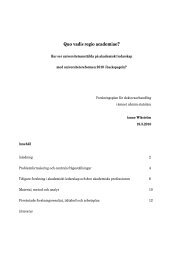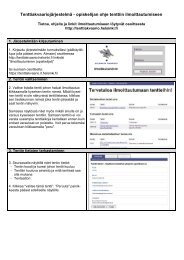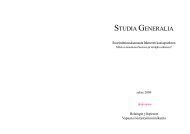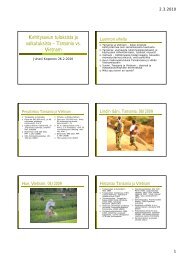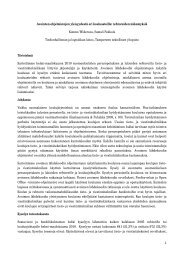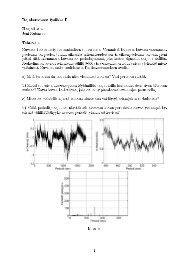Power and intoxication: self-control and discipline for the famous
Power and intoxication: self-control and discipline for the famous
Power and intoxication: self-control and discipline for the famous
You also want an ePaper? Increase the reach of your titles
YUMPU automatically turns print PDFs into web optimized ePapers that Google loves.
<strong>Power</strong> <strong>and</strong> <strong>intoxication</strong>: <strong>self</strong>-<strong>control</strong><strong>and</strong> <strong>discipline</strong> <strong>for</strong> <strong>the</strong> <strong>famous</strong>Robin RoomSchool of Population Health, University of MelbourneAER Centre <strong>for</strong> Alcohol Policy Research,Turning Point Alcohol & Drug Centre, Fitzroy, Victoria, AustraliaCentre <strong>for</strong> Social Research on Alcohol & Drugs (SoRAD),Stockholm University, Stockholm, SwedenLecture in <strong>the</strong> course, “Regulation of life-styles in welfaresociety: <strong>Power</strong>”, Sociology Department, HelsinkiUniversity, 16 October, 2007.
The symbolic power of substance use• Positive symbolism of use– Champagne = celebration• Positive symbolism of abstaining– Marker of faith <strong>for</strong> Muslims, Mormons ...• Negative symbolism of use or heavy use– “drunkard”, “dope field”, “alcoholic”, “drug addict”,“dependent on drugs” all stigmatized• Negative symbolism of abstaining– “wowser”• Variation by time <strong>and</strong> place in <strong>the</strong> symbolism
Properties behind <strong>the</strong> symbolic power: 1• Valued physical goods– Amenable to commodification, industrialization, globalization– Access as a symbol of power <strong>and</strong> domination• Use as a social behaviour– A per<strong>for</strong>mance in front of o<strong>the</strong>rs– Demarcating <strong>the</strong> social group’s boundaries ofinclusion/exclusion• Taken into body– Intimate behaviour– Fateful: can contaminate – poison, infection, sin, spiritpossession– Subject to prescriptions <strong>and</strong> taboos
Properties behind <strong>the</strong> symbolic power: 2• Psychoactive = power to affect thinking &behaviour– Intoxication, taking one out of one<strong>self</strong>– Valued <strong>and</strong> feared: Double edge of terms:• pharmakon, drug, <strong>intoxication</strong>– Intoxicated behaviour as unpredictable,intractable, dangerous powerful• The disinhibition axiom• Causing addiction/dependence– Enslavement, loss of <strong>control</strong> of drug use <strong>and</strong> of life– But heavy use as a symbol of power, access toresources• So multiple underlays of symbolic power
Drinking, <strong>intoxication</strong> <strong>and</strong> social power(see <strong>the</strong> Pat Morgan reading)• In <strong>the</strong> powerful, it can be– A prerogative of status– A means of intimidation• In <strong>the</strong> powerless, it can be– A marker of unworthiness of <strong>the</strong> social group– A sign of personal unworthiness• A person-centred explanation of deviance• Given <strong>the</strong> power assigned to it, alcoholmay be denied to a subordinate group• Alternatively, making alcohol freelyavailable may disorganize resistance
Alcohol <strong>and</strong> intimate domination(see <strong>the</strong> Room reading)• Intoxication as an explanation of <strong>the</strong>o<strong>the</strong>rwise unjustifiable– Legitimating irrationality– An external agent (“it’s <strong>the</strong> alcohol talking”)– The mere threat of drinking can be coercive• Rein<strong>for</strong>ces domination particularly when itis in decline or flux?• The ambiguous cultural status of <strong>the</strong>disinhibition axiom
On <strong>the</strong> o<strong>the</strong>r h<strong>and</strong>: modernity <strong>and</strong> <strong>the</strong>expectation of <strong>self</strong>-<strong>control</strong>• Rationality as <strong>the</strong> norm, <strong>the</strong> irrational needs explaining– A preference <strong>for</strong> rationalizing explanations• Intoxication as <strong>the</strong> archetype of impaired <strong>control</strong>• A divorce between will <strong>and</strong> desire– That we can find ourselves doing things we desire even againstour will– Is will something permanent with a continuing existence in us, ordoes it change from moment to moment?• Jon Elster, Ulysses <strong>and</strong> <strong>the</strong> Sirens• Economists <strong>and</strong> “rational addiction”: <strong>the</strong> temporal structure of“preferences”• The individuation of social <strong>control</strong>: The culturalimperative of <strong>self</strong>-<strong>control</strong> (Norbert Elias, The Civilizing Process)– Demonstrating <strong>self</strong>-<strong>control</strong> with respect to alcohol or drugs– Within culturally determined limits (MacAndrew & Edgerton, DrunkenComportment)
Self-<strong>control</strong>, <strong>intoxication</strong> <strong>and</strong> addiction• “Epidemics of <strong>the</strong> will” – Eve Sedgewick, 1992– “<strong>the</strong> peculiarly resonant relations that seem to obtain between<strong>the</strong> problematics of addiction <strong>and</strong> those of <strong>the</strong> consumer phaseof international capitalism”• Self-<strong>control</strong> both moment-to-moment, <strong>and</strong> through time– Intoxication as failure of <strong>self</strong>-<strong>control</strong> in <strong>the</strong> moment– Addiction as failure of <strong>self</strong>-<strong>control</strong> through time– Some linkage: Failure in many moments adds up to addiction• Addiction <strong>and</strong> <strong>intoxication</strong> as explanations of behaviour:– Secularized, material explanations of possession, <strong>the</strong> individualbehaving “not like him/her<strong>self</strong>”• Self-<strong>control</strong> as a transcendent social value, but also– something to be demonstrated in daily life
Among modern elites• The primary relation to power: Intoxication<strong>and</strong> drug use as prerogatives <strong>and</strong> markersof privilege <strong>and</strong> affluence• vs. <strong>self</strong>-<strong>control</strong> <strong>and</strong> sobriety, at least inpublic• The solution: <strong>the</strong> guarded privacy of <strong>the</strong>powerful– Physical <strong>and</strong> social walls between <strong>the</strong> public<strong>and</strong> <strong>the</strong> private– The private vs. public spheres are <strong>the</strong>re also<strong>for</strong> <strong>the</strong> less powerful, but with much lessguarding
Breaching <strong>the</strong> boundary:threats to reputation <strong>and</strong> <strong>self</strong>-image• Intoxication (<strong>and</strong> illicit drug use) as semi-privatebehaviour <strong>for</strong> all– Exceptions:• fiesta times (carnaval, Valborgsafton, midsommar, russefeiring ...);• youth??• An important part of <strong>self</strong> <strong>control</strong> is keeping it private(Gusfield’s “competent drinker”)• But trouble happens, breaching <strong>the</strong> boundary of semiprivacy– <strong>the</strong> car accident, <strong>the</strong> argument or fight, <strong>the</strong> betrayal• The o<strong>the</strong>rwise private is suddenly revealed• The urgent need <strong>for</strong> a public figure: how to reestablishcredibility as a person in <strong>control</strong> of one<strong>self</strong>– 3 case studies ...
Breaching <strong>the</strong> boundary: case 1• Rebekah Wade• Dubbed <strong>the</strong> "Red Top's red top"<strong>for</strong> her pre-Raphaelite tresses,Wade is <strong>the</strong> Sun's first femaleeditor.• Despite a <strong>for</strong>midable workschedule, Wade finds time to mixwith <strong>the</strong> same celebrities <strong>and</strong>politicians often pilloried in herpages. Out with her husb<strong>and</strong>,<strong>for</strong>mer-EastEnder <strong>and</strong> NewLabour fan Ross Kemp, she waseven pictured hugging CherieBlair….• She has been a long-time [Rupert]Murdoch employee, working herway up from <strong>the</strong> News of <strong>the</strong>World's colour magazine tobecome, by 2000, <strong>the</strong> youngesteditor in Fleet Street.• Her tenure at [News of <strong>the</strong> World]was punctuated by her "naming<strong>and</strong> shaming" of knownpaedophiles, after <strong>the</strong> murder ofschoolgirl Sarah Payne. Only afterattacks on innocent men, riots inPortsmouth <strong>and</strong> <strong>the</strong> vilification ofeven some "paediatricians", didWade reluctantly pull <strong>the</strong> plug on<strong>the</strong> campaign.• --- BBC4 Documentary, 15 May2003http://www.bbc.co.uk/bbcfour/documentaries/profile/rebekah-wade.shtml
Breaching <strong>the</strong> boundary: case 1• “in good <strong>for</strong>m”, <strong>and</strong> <strong>the</strong>n a row:– “The editor of Britain's best-selling daily newspaper becameembroiled in controversy yesterday after being arrested onsuspicion of assaulting her soap star husb<strong>and</strong>. Rebekah Wade, 37,who recently launched a campaign in her newspaper, <strong>the</strong> Sun, tostamp out domestic violence, found her<strong>self</strong> in a police cell inBattersea....”– She had started out with a consolatory drink with a friend who hadjust resigned in disgrace as a cabinet minister, <strong>and</strong> went on to aburthday party <strong>for</strong> her boss’s son-in-law.– At <strong>the</strong> party, “Insiders said [that at <strong>the</strong> party Wade <strong>and</strong> her husb<strong>and</strong>Ross Kemp], who met 10 years ago, were "in good <strong>for</strong>m". Butbetween <strong>the</strong> end of <strong>the</strong> birthday party <strong>and</strong> <strong>the</strong>ir arrival home, a rowstarted. According to sources close to <strong>the</strong> couple it developedquickly <strong>and</strong> Kemp rang 999 in a fit of anger - a call which broughtpolice to <strong>the</strong>ir Battersea home. When officers arrived <strong>the</strong>y foundKemp with a thick lip <strong>and</strong> arrested his wife. She had her fingerprintstaken <strong>and</strong> submitted a DNA sample be<strong>for</strong>e being locked in a cell tosleep.”-- Guardian (London), Nov. 4, 2005
Breaching <strong>the</strong> boundary, case 1 (cont’d)• Shamed Sun editor Rebekah Wade today downplayed reports of analleged assault on her husb<strong>and</strong>, EastEnders star Ross Kemp, butadmitted a row had 'got out of h<strong>and</strong>'.• Last night Kemp said <strong>the</strong> row was a "fuss about nothing" <strong>and</strong> Wadedescribed it as a "silly row which got out of h<strong>and</strong>".• The newspaper also relegated <strong>the</strong> story as it focused today's frontpage on <strong>the</strong> o<strong>the</strong>r twist to <strong>the</strong> EastEnders tale, an assault on RossKemp's onscreen bro<strong>the</strong>r, Steve McFadden, by his ex-girlfriend.Only at <strong>the</strong> bottom of page one did it refer to <strong>the</strong> incident involvingits editor stating "And his bruv's had a bit of bo<strong>the</strong>r too". [Daily MailNov. 5, 2005]• “As she awoke that morning in a police cell with a hangover,… shemust have hoped it was all a bad dream. But some observers think<strong>the</strong> real nightmare is still to come, <strong>and</strong> <strong>the</strong> rumour mill has beenspinning out of <strong>control</strong> about <strong>the</strong> potential <strong>for</strong> fur<strong>the</strong>r revelationsabout <strong>the</strong> Wade-Kemp bustup.” -- Guardian, Nov. 7, 2005• On 31 January 2007 <strong>the</strong> London-based magazine Private Eyereported that <strong>the</strong> couple had separated, that Wade had moved toChelsea, <strong>and</strong> that no major newspaper was covering <strong>the</strong> story.Wade is reportedly currently seeing <strong>for</strong>mer racehorse trainer,Charlie Brooks. [Wikipedia]
Breaching <strong>the</strong> boundary: case 2• Per Bill, member of <strong>the</strong> Swedish Parliament– In a debate in Parliament in 2003, Per Bill, as <strong>the</strong> spokesman onalcohol policy of <strong>the</strong> right-wing Moderate Party, called traditionalSwedish policy a "big bro<strong>the</strong>r policy", <strong>and</strong> called instead <strong>for</strong> an alcoholpolicy based on "individual responsibility,... a powerful prosecution ofalcohol-related crime <strong>and</strong> at <strong>the</strong> same time helping actions <strong>for</strong> thosewho have a problem with alcohol".– On Sept. 9, 2004 at 5 pm Per Bill was jogging with a small child in astroller on a quay in a busy part of Stockholm. He had been at awinetasting, where he says that he had tried about 25 wines. People<strong>the</strong>re apparently tried to get him to take a taxi home, but he insisted onwalking -- it was a beautiful late-summer day. He had often taken hischildren with him to wine-tastings, he said, because he wanted <strong>the</strong>m tohave "a natural relationship with wine <strong>and</strong> not see it as something thatis taboo". Wine-tastings are a big hobby of his, <strong>and</strong> he says he is usedto trying between 4000 <strong>and</strong> 6000 wines each year, <strong>and</strong> writing aboutwine-tastings in <strong>the</strong> magazine "Dina viner" (your wines).
Breaching <strong>the</strong> boundary – case 2 (cont’d)• As Per Bill passed a restaurantboatnext to <strong>the</strong> quay, <strong>the</strong> strollerwas weaving around <strong>and</strong> seemedclose to overturning, according towitnesses at <strong>the</strong> scene. Withheavy traffic nearby, <strong>the</strong>re alsoseems to have been <strong>the</strong> dangerof an accident. The guard at <strong>the</strong>boat, a woman who is <strong>the</strong> mo<strong>the</strong>rof three children, was concernedabout <strong>the</strong> child, <strong>and</strong> stopped Bill<strong>and</strong> persuaded him to come withher to <strong>the</strong> watch-office on <strong>the</strong>boat. She says <strong>the</strong>re was a halffinishedbottle of wine in <strong>the</strong>stroller.• Then he tried to make an escape,<strong>and</strong> she wrestled with him after acouple of steps. He hit herrepeatedly on <strong>the</strong> arm <strong>and</strong> facewith his mobile phone, causing her to bleed.The stroller overturned during <strong>the</strong> fracas. With<strong>the</strong> help of ano<strong>the</strong>r guard <strong>and</strong> a passingmotorist, he was subdued <strong>and</strong> h<strong>and</strong>cuffed.During this, he had tried to pull rank as amember of parliament, in fact presentinghim<strong>self</strong> as ano<strong>the</strong>r member of his party who isa <strong>for</strong>mer <strong>for</strong>eign minister. His explanation isthat he was afraid <strong>the</strong> guard was trying to hurthim <strong>and</strong> <strong>the</strong> child, <strong>and</strong> just wanted to get away.
Breaching <strong>the</strong> boundary – case 2 (cont’d)• The regular police finally responded to <strong>the</strong> guard's call about anhour later, <strong>and</strong> took Bill away to <strong>the</strong> drying-out station, where <strong>the</strong>yheld him <strong>for</strong> six hours <strong>and</strong> released him. They held him under <strong>the</strong>law which allows <strong>the</strong> police to hold a drunk person who is a dangerto <strong>the</strong>mselves or to o<strong>the</strong>rs. They also wrote him up on suspicion ofinjury to a civil servant (presumably <strong>the</strong> private guard). The childwas left with <strong>the</strong> guard, who reports that she changed <strong>and</strong> fed "<strong>the</strong>poor little one" be<strong>for</strong>e <strong>the</strong> mo<strong>the</strong>r arrived to pick <strong>the</strong> child up afterabout a fur<strong>the</strong>r hour.• The leadership of <strong>the</strong> Moderates was dismayed by <strong>the</strong> events,noting that <strong>the</strong>y had seen no evidence that Bill had a problem withalcohol. They dem<strong>and</strong>ed that he hold a single-person pressconference<strong>the</strong> next day at <strong>the</strong> party headquarters, where he wouldannounce that he was <strong>the</strong> person involved, that he is taking time outfrom politics <strong>and</strong> that he will seek professional advice on whe<strong>the</strong>r hehas an alcohol problem. O<strong>the</strong>rwise <strong>the</strong>y would announce that <strong>the</strong>yhad decided on <strong>the</strong> time-out <strong>for</strong> him.
Breaching <strong>the</strong> boundary – case 2 (cont’d)The press conference was duly held,with Bill having had little or no sleep<strong>for</strong> 24 hours. His account of whathappened sounded confused. Bu<strong>the</strong> acknowledged that "it is easy tounderst<strong>and</strong> how eyebrows mighthave been raised a little when aperson dressed as I am now (bluejacket, beige pants, checked shirtwithout tie, com<strong>for</strong>table shoes) <strong>and</strong>with red teeth <strong>and</strong> blue tongue <strong>and</strong>rucksack in front comes joggingwith a stroller <strong>and</strong> smells very muchof red wine"."No, Bill doesn't think he has aproblem with alcohol", reported <strong>the</strong>centre-left newspaper. "He indeeddrinks more than <strong>the</strong> normalSwede, he said, but only wine withmeals four or five times aweek, spirits only 5 times a year <strong>and</strong><strong>and</strong> never beer". Bill said, "But now Iwill get a professional judgment aboutthat. Maybe this is a very good alarmbell <strong>for</strong> me".
Breaching <strong>the</strong> boundary – case 2 (cont’d)Seven months later, on 5 April 2005, a courtcleared Bill of <strong>the</strong> charges on <strong>the</strong> grounds that<strong>the</strong> fracas had occurred outside <strong>the</strong> limit of <strong>the</strong>restaurant guard’s jurisdiction. Bill said, “it feelsas if I woke up from a 7-months-long nightmare”.The court said it understood <strong>the</strong> guard’s judgementthat <strong>the</strong>re was a risk that Bill <strong>and</strong> his son wouldcome to harm but “<strong>the</strong> fact remained that <strong>the</strong>intervention had been without a legal basis”.Per is still in <strong>the</strong> Swedish parliament, but no longer<strong>the</strong> Moderates’ spokesperson on alcohol policy.– Translations by RR from Dagens nyheter, Svenska dagbladet <strong>and</strong>Expressen
Breaching <strong>the</strong> boundary – case 3Anna Sjödin, <strong>the</strong> 29-year-old national chair of <strong>the</strong>SSU, <strong>the</strong> youth organization of <strong>the</strong> Swedishsocial democrats, had been out partying on 29January, 2006 with her SSU comrades,reportedly <strong>for</strong> 9 hours. They were drinking at <strong>the</strong>Crazy Horse, a relatively inexpensive bar inStockholm’s most fashionable nightlife district,Stureplan. At 2 am <strong>the</strong> party was seen as toodrunk by <strong>the</strong> bar staff, <strong>and</strong> refused fur<strong>the</strong>rdrinks. They protested noisily about this. Thebar staff called <strong>the</strong> door-guards to make <strong>the</strong>mleave. Sjödin, who 12 years be<strong>for</strong>e had playedrugby <strong>for</strong> Sweden, led <strong>the</strong> resistance to <strong>the</strong>eviction. A guard, Babek Jamal, claimed thatSjödin had fought him tooth <strong>and</strong> claw <strong>and</strong>shrieked, among o<strong>the</strong>r things, “jävlasvartskalle”, a racist taunt, <strong>and</strong> “Such as you are<strong>the</strong> type of immigrants we don’t want to have inthis country”. Sjödin claimed that he had calledher a “whore” <strong>and</strong> o<strong>the</strong>r sexist taunts, <strong>and</strong> thattwo guards had held her down while a third hi<strong>the</strong>r with a baton.
Breaching <strong>the</strong> boundary – case 3 (cont’d)• The police were called,<strong>and</strong> took Sjödin awayto a drying-out cell.Both she <strong>and</strong> <strong>the</strong> guardcharged each o<strong>the</strong>rwith crimes.• Sjödin held a hastilyarranged pressconference <strong>the</strong> nextday, <strong>and</strong> denied beingdrunk or making <strong>the</strong>racist taunt.
Breaching <strong>the</strong> boundary – case 3 (cont’d)• On <strong>the</strong> basis of a 189-page investigative report,Sjödin was charged on 7 April with three counts,including making a racist insult. The guard wasnot charged.• On 13 October 2006 Sjödin was found guilty onall charges, <strong>and</strong> fined SEK 360,000, <strong>and</strong>ordered to pay damages of SEK 5,500 to <strong>the</strong>guard. She <strong>the</strong>n took “time-out” from her SSUduties <strong>and</strong> appealed. The higher courts deniedher appeals, <strong>and</strong> on 16 December she resignedher position as chair of <strong>the</strong> SSU.– Sources: Svenska dagbladet, Dagens nyheter, Wikipedia
The double frame of <strong>intoxication</strong>:private partying vs. public decorum• Sources of media fascination:– Everyone looks like a hypocrite:• Rebekah Wade & her campaign against domestic violence• Per Bill <strong>and</strong> his critique of Swedish "big bro<strong>the</strong>r policy” onalcohol• Anna Sjödin <strong>and</strong> <strong>the</strong> SSU’s restrictive st<strong>and</strong> on alcoholpolicies, anti-racism stance– The deer frozen in <strong>the</strong> headlight:• The moment when <strong>the</strong> private turns public• Pressure from associates to put <strong>the</strong> best face on it <strong>the</strong> nextmorning– Partly <strong>for</strong>ced by Swedish press policy of not naming <strong>the</strong>accused; “a member of parliament from <strong>the</strong> Moderates”makes all suspect
Ways of interpreting <strong>the</strong> double frame• The action of <strong>the</strong> drug it<strong>self</strong>– “A marked ambivalence [of] attitude <strong>and</strong> opinion concerning <strong>the</strong>proper place of alcohol in social life ... in part ... stems from anawareness that satisfactions brought by ímbibing alcohol notinfrequently have a spurious quality. What seems to be love to <strong>the</strong>intoxicated maiden turns out to in sober retrospect to have beensex exploitation.... Modifications in human behavior brought aboutby <strong>intoxication</strong> are socially <strong>and</strong> personally destructive as well associally integrative.”-- E. Lemert, Alcohol, values <strong>and</strong> social <strong>control</strong>, pp. 553-575 inDJ Pittman & CR Snyder, eds., Society, Culture & Drinking Patterns. NY: Wiley, 1962.• Drunken comportment as “time out”, operating under adifferent set of norms from sober comportment (<strong>the</strong> “withinlimits” clause) – C. MacAndrew & R. Edgerton, Drunken Comportment, Chicago: Aldine,1969.– But <strong>the</strong> hypo<strong>the</strong>sis of a specific set of norms <strong>for</strong> drunkenness hasnot been tested– How does "time out” relate to <strong>the</strong> subcultural norms on <strong>self</strong>-<strong>control</strong><strong>the</strong> qualitative studies find <strong>for</strong> drinkers <strong>and</strong> drug users?
One remedy <strong>for</strong> failure of <strong>self</strong><strong>control</strong>:pleading addiction• But this entails an enormous loss of face <strong>and</strong> often <strong>self</strong>-respect– The “general <strong>the</strong>me underlying” American statements on alcoholism “hasto do with lack of <strong>self</strong>-<strong>control</strong> on <strong>the</strong> part of <strong>the</strong> drinker. This societalsymbolism of <strong>the</strong> deviation as a sign of character weakness is one of <strong>the</strong>most vivid <strong>and</strong> isolating distinctions which can be made in a culturewhich attributes morality, success, <strong>and</strong> respectability to <strong>the</strong> power of a<strong>discipline</strong>d will.” – E. Lemert, Social Pathology, 1951:356.• So often resisted:– Bill: “I am 99% sure that I do not have an alcohol problem’. He has beenin contact with an alcohol counselor who certified that Bill did not haveany signs of having a problem with his drinking.” -- Expressen, 27 Oct. 2004– No mention by Sjödin, who maintained her innocence throughout, <strong>and</strong>felt let down by <strong>the</strong> courts.– In contrast, Mel Gibson, accused of making anti-Semitic remarks to anarresting officer when arrested <strong>for</strong> drinking driving, apologized profusely<strong>and</strong> went into alcoholism treatment. The judge ordered him to attend<strong>self</strong>-help meetings five times a week <strong>for</strong> 4½ months <strong>and</strong> three times aweek <strong>for</strong> <strong>the</strong> remainder of <strong>the</strong> first year of his probation.– US Drug Courts rely on <strong>the</strong> threat of a jail sentence of at least a year tocoerce acknowledging a drug problem <strong>and</strong> cooperating with treatment.
Intoxication <strong>and</strong> drug use as a semi-private world• Operationally, <strong>control</strong>led use is use that– does not result in trouble– stays out of <strong>the</strong> public eye• ”Time out” from <strong>the</strong> business/civic/parental worlds ofstrict rationality– ”time out” attached to different behaviours in differentcultures/social worlds (MacAndrew & Edgerton)– <strong>the</strong> “fiesta” exception: public disinhibition <strong>and</strong> time out• Intoxication as inherently dangerous, but <strong>the</strong> danger isnormatively limited (Goffman, “Where <strong>the</strong> action is”)• ”Within limits” indeed– but <strong>the</strong> limits are specific to <strong>the</strong> particular social world, <strong>and</strong> <strong>the</strong>remay not be a single set of limits– normative limits in different social worlds need study
Problems in <strong>the</strong> management of social order:<strong>the</strong> rupturing of <strong>the</strong> frame of privacy• Drug use <strong>and</strong> <strong>intoxication</strong> are often ostensiveper<strong>for</strong>mances– In front of an audience– The per<strong>for</strong>mance may be about <strong>self</strong>-<strong>control</strong>– The audience can rupture <strong>the</strong> boundary ofprivacy (particularly <strong>for</strong> <strong>the</strong> powerful & <strong>famous</strong>)• Disinhibition, clumsiness or mischance– The semi-private suddenly becomes public– Sc<strong>and</strong>al, shame, derogation, defrocking– Pleading addiction: a thorny resolution



